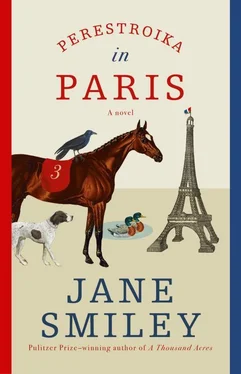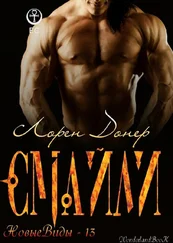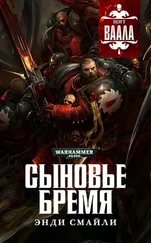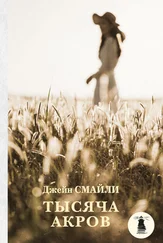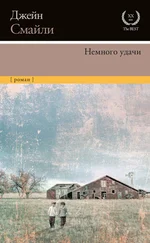Jane Smiley
PERESTROIKA IN PARIS
Part One

Paras had won her race. She had jumped all the jumps with a great deal of pleasure, and, she thought, in excellent form. The number-two horse, a chestnut gelding from down south somewhere, had been so far behind her that she hadn’t been able to hear his hoofbeats on the turf (and of course the crowd was yelling, too). She had, she thought, almost danced across the finish line. Everyone was happy—the jockey did a backflip off her, the groom gave her a kiss, and Delphine, her trainer, gave her a hug and three lumps of brown sugar, not to mention an excellent feed of carrots when she was all cool and calm after the race.
Since it was the last race of the day, and, indeed, the year—it was early November—the van, which already had its four horses, had left before her race began, so as to come back and get her, but now the van was late, the stable was empty, and Rania, her groom, had, she said, gone to the bathroom, and why not in the stall, thought Paras, but she could never get an answer to this question.
Twilight was descending over the vast green expanse of Auteuil Racecourse. The jumps had dimmed into dark shapes against the still vivid green grass. Admiring this, Paras did something that she often did—she pressed against the door of the stall, and this time something happened that had never happened before—it swung open. After a moment, Paras stepped carefully out onto the fine, crunchy gravel and snorted. Everything remained quiet. She could see now that every stall was empty and dark—in fact, the green of the racecourse was the brightest color around, so bright that, for a moment, she didn’t dare head out there. But Paras was a very curious filly.
At her feet were several items that Rania had left behind—the grooming box, full of brushes, Paras’s blue blanket, and something that Paras knew was called a “purse.” This was the only thing that interested Paras—she had seen lots of purses, and heard even more about them—she had, in fact, just won a purse, and so, she thought, this would certainly be it. She dropped her nose, snuffled a bit, and found the handle. She picked it up, and trotted out of the stable yard onto the racecourse. Really, she thought, for a horse who had just run a long race, and with fourteen jumps, she felt quite full of beans. She kicked up her heels and gave a squeal.
To begin with, Paras had no idea of making a getaway. Not only did she like racing, and Delphine, and Rania, and her “owner,” Madeleine, and several of the other horses, as well as her nice clean stall up there in Maisons-Laffitte, she really didn’t know much else—none of the horses did. All had been born on pleasant farms in the country, and all had come to Maisons-Laffitte when they were hardly more than babies, and all had been galloping and eating and riding in the van and racing and galloping and eating and racing for quite a while, as long as Paras could clearly remember, actually. It was an active life, and in Maisons-Laffitte there was plenty to see of a morning, especially if you raced over jumps. But the horses did talk among themselves about what else might be out there. Some worldly ones who had traveled from down south, or from across the sea, had seen different courses. They lorded it over the others a bit. There were also those who talked about escaping this life, but they never talked about what else they might do. Paras did not think that any of them were as curious as she was.
And here was the grass—turf, they called it, but grass, really, as thick and green and appetizing as it could possibly be, and a racehorse never got to eat a strand of it, never even thought of doing such a thing. A racecourse was for racing. Paras took a few bites.
It has to be said that the grass was delicious—sweet, fragrant, flavorsome, and a little fruity-tasting. A mouthful was excellent chewing—not too light, but not at all tough, like hay. And it was nice to bite off the living stalks. She walked along, nibbling, occasionally trotted, occasionally kicked up her heels, and even reared twice, just for the fun of it. She was careful to keep track of her purse, though, and always circled back to retrieve it before she got too far away. Pretty soon it was completely dark, but Paras didn’t mind. She could see quite well in the dark.
She romped and grazed, and minded her purse, sniffed a jump here and there, and recalled her race. She inspected interesting herbs and bushes, got into the woods, and then there she was, at the side of what she knew was a road. Roads were for vans—she had traveled many a road.
Across the road were several interesting sights: More trees, more paths. Some tall buildings. Another road that ran between them. Cars—she was quite familiar with cars—parked and quiet beside the buildings. Here and there, the buildings were lit up. There was grass, and it was that, in the end, that lured her across the road. Her shoes rang on the pavement with a pleasing resonance. She lifted her tail and arched her neck and blew out her nostrils a few times. Soon she had left the park far behind.

NO ONE KNEW that Frida lived in the Place du Trocadéro, but she did. Frida was an elegant German shorthaired pointer, ticked all over, but with a brown head and two brown patches on her back. She sat proudly here and there about the Place, making believe that she belonged to this human or that one and was simply waiting to be taken home after a nice walk. There were so many crowds around the Place du Trocadéro that no one noticed her, and so much food thrown out that maintaining her figure was as easy as could be. She was also careful to groom herself from top to bottom every day. Frida was intimately familiar with the Place, because her former owner, Jacques, spent a lot of time there—seven roads entered a nice roundabout that encircled a small green space with plenty of trees and bushes, which meant that the cars had to slow down, which meant that Jacques was more likely to receive a contribution. Up the hill was a crowded cemetery where Jacques liked to sleep when the weather was warm; Frida went up there in the evenings. Two large buildings separated by a slippery exposed area that Frida didn’t like (Jacques called it the Palais de Chaillot) overlooked a large park full of paths and trees that swept down to the river. This meant that there was always a place to run around, and plenty of humans strolling here and there—also good for contributions. Frida bathed regularly in the pool below “the Palais.” You could not be a dog in Paris and be dirty or smelly—if you were, the gendarmerie would take you in for sure.
Frida had never been taken in by the gendarmerie. Jacques had impressed on her that such a fate was unspeakable—every time he even saw a police car or a policeman in the distance, he got up off the pavement, picked up his dish, his mat, and his guitar, and led Frida into some alley or other. Jacques knew every alley, every courtyard, and every cemetery, especially on the west side of the river, and he and Frida had slept in many of them. And then, one morning, in a courtyard a little ways down the river, he didn’t wake up, and here came the gendarmerie, and Frida slipped away. She watched from a distance as they picked him up, put him in a van, and drove him off, and she never understood that. They left his guitar behind. Frida visited it twice and sniffed it for evidence of what had happened, but she could not figure it out. It was hot and bright and the leaves were all over the trees when they took him away, and now it was getting cold and the leaves had fallen, and Frida had to admit that, in spite of the occasional pats she got from passersby, she was a lonely dog, and not quite sure what to do. Jacques had been her only friend, and Jacques had had no friends. How to make a friend, either dog or human, was a mystery to her. It was not only that Jacques had been solitary and protective, it was also that dogs in Paris, on leashes, neatly garbed, kept to themselves. If Frida approached one, it barked instantly, loudly, reporting her misbehavior.
Читать дальше
